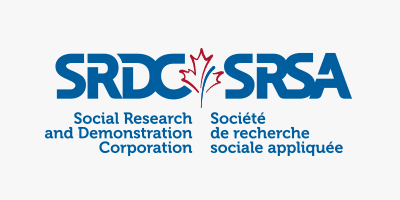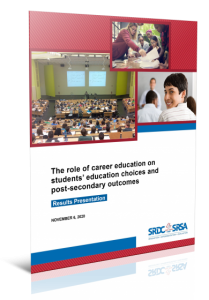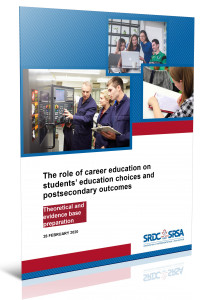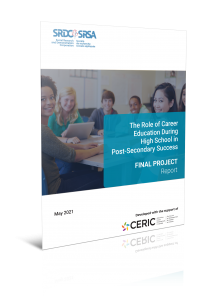
Finding ways for young people to achieve their full potential is a universally shared political objective, whether the ultimate goal is economic growth, innovation and competitiveness, or promoting social inclusion and reducing social and health inequalities. Many from disadvantaged groups will need to pursue post-secondary education (apprenticeship, college or university) to thrive in the global knowledge economy. Yet many face barriers to pursuing their preferred career pathway. Lack of confidence in the affordability of the required educational pathways, reduced access to knowledgeable professional advice, potential mentors, role models or other information supports, inertia in decision-making and discrimination can all negatively affect timely decision-making.
While Canada is an international leader on many indicators of K-12 education performance (OECD, 2010a) and has among the highest rates of PSE attainment of all OECD countries (Buchanan, 2013), it still has a significant proportion of youth who leave the formal education system ill-equipped for their transition to the world of work. Transition “derailment” can take many forms:
- Students leaving high school before graduating;
- High school graduates who go straight to the workplace but struggle to provide the job skills required of them;
- High school graduates who go on to apprenticeships, college or university but who drop out, or switch inefficiently, citing a lack of “fit”; and
- PSE graduates who secure employment after graduation for which they are substantively overqualified who can question the investments they made in PSE (which can in turn deter others from making educational investments) and feel dissatisfaction with their work.

The role of career education on students’ education choices and post-secondary outcomes: Final research report

The role of career education on students’ education choices and postsecondary outcomes: Theoretical and evidence base preparation
Final Project Report – Learn about the experience of the project partner in delivering this project with key findings and insights.
This project seeks to find better ways to support youths’ career decisions and make the case for policies that prolong learning into appropriately aligned post-secondary education. SRDC will use two rich longitudinal data sources created to test experimental career interventions through the linkage of education records to surveys of youth and parents. The data document the lives of 7,000 young Canadians in three provinces, including their occupational aspirations as high school students at age 14, their post-secondary education and earnings outcomes over 10 years.
Research tasks include the team mapping the students’ early collected occupational aspirations to their course and program choices as well as outcomes on leaving high school. SRDC’s researchers will take advantage of the experimental design but also use non-experimental methods to analyze the factors over this key period that caused changes in career choices and altered career pathways. We will investigate the mediating role of influences such as the level of parent involvement, frequency of advice from school counsellors, teachers and others, as reported by the youth in Grade 12 on the relationship between their aspirations, the different sources of advice youth obtained and their career outcomes.
The study will add immensely to the body of knowledge about (a) how and when to intervene to assist youth in their career decision making, and (b) for whom supports are effective yet currently lacking. The intent is to help equip the career counselling profession to respond authoritatively to increasingly urgent policy questions about how optimally to structure career education for young people. Positive and negative impacts of interventions and tracking of outcomes following specific mediators of advice (such as parents, teachers, counsellors, peers) would point to future best practices and the development of tools to support the work of counsellors and guide students in their planning and decision making regarding career choices early in, and throughout, high school.

